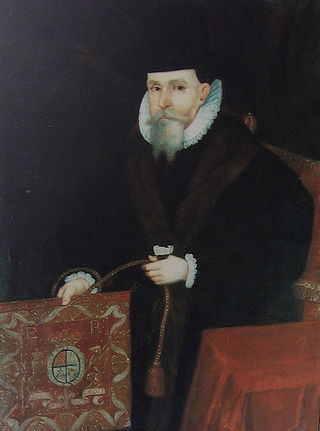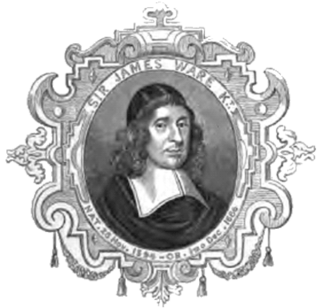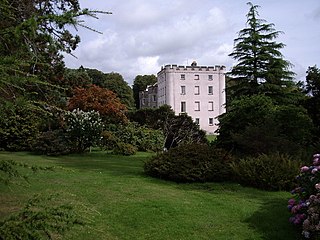Related Research Articles
Adam Loftus, 1st Viscount Loftus, was Lord Chancellor of Ireland from 1619 and from 1622 raised to the peerage of Ireland as Viscount Loftus of Ely, King's County. His uncle, another Adam Loftus, was both Lord Chancellor of Ireland and Church of Ireland primate.

Adam Loftus was Archbishop of Armagh, and later Dublin, and Lord Chancellor of Ireland from 1581. He was also the first Provost of Trinity College Dublin.

Earl of Gosford is a title in the Peerage of Ireland. It was created in 1806 for Arthur Acheson, 2nd Viscount Gosford.

Sir James Ware was an Anglo-Irish historian.

Henry Ussher was an Irish Protestant churchman, a founder of Trinity College Dublin, and Church of Ireland Archbishop of Armagh.

Sir Edward Seymour, 2nd Baronet was an English landowner and politician who sat in the House of Commons between 1601 and 1625. He was an ambassador to Denmark. During the English Civil War, he supported the Royalist cause.
Sir William Parsons, 1st Baronet of Bellamont, PC (Ire), was known as a "land-hunter" expropriating land from owners whose titles were deemed defective. He also served as Surveyor General of Ireland and was an undertaker in several plantations. He governed Ireland as joint Lord Justice of Ireland from February 1640 to April 1643 during the Irish rebellion of 1641 and the beginning of the Irish Confederate War.
The High Sheriff of County Kilkenny was the British Crown's judicial representative in County Kilkenny, Ireland from the 16th century until 1922, when the office was abolished in the new Free State and replaced by the office of Kilkenny County Sheriff. The sheriff had judicial, electoral, ceremonial and administrative functions and executed High Court Writs. In 1908, an Order in Council made the Lord-Lieutenant the Sovereign's prime representative in a county and reduced the High Sheriff's precedence. However, the sheriff retained his responsibilities for the preservation of law and order in the county. The usual procedure for appointing the sheriff from 1660 onwards was that three persons were nominated at the beginning of each year from the county and the Lord Lieutenant then appointed his choice as High Sheriff for the remainder of the year. Often the other nominees were appointed as under-sheriffs. Sometimes a sheriff did not fulfil his entire term through death or other event and another sheriff was then appointed for the remainder of the year. The dates given hereunder are the dates of appointment. All addresses are in County Kilkenny unless stated otherwise.
The Sheriff of County Dublin was the Sovereign's judicial representative in County Dublin. Initially, an office for a lifetime, assigned by the Sovereign, the Sheriff became an annual appointment following the Provisions of Oxford in 1258. The first recorded Sheriff was Ralph Eure, appointed in that year. The next recorded Sheriff was Sir David de Offington, who was Sheriff in 1282. Besides his judicial importance, the sheriff had ceremonial and administrative functions and executed High Court Writs.
There have been two baronetcies created for persons with the surname Meredyth, both in the Baronetage of Ireland. Both are extinct.

Sir John Philipps, 1st Baronet was a Welsh landowner and politician who sat in the House of Commons in 1601.
Sir Paul Davys was an Irish politician and civil servant, who held office as Clerk to the Privy Council of Ireland and later as Secretary of State (Ireland). He had considerable influence in public affairs, and enjoyed the close friendship of the Lord Lieutenant, James Butler, 1st Duke of Ormonde. His sons, William and John, both attained high office. He was the grandfather of Paul Davys, 1st Viscount Mount Cashell.
Sir Thomas Burdett, 1st Baronet was an Irish politician and baronet.
Thomas Molyneux, or Molinel (1531–1597) was a French-born English statesman, who held high office in Ireland during the Elizabethan era. He founded a dynasty which produced several distinguished members, and became the Molyneux baronets of Castle Dillon, County Armagh.
Sir Richard Gorges-Meredyth, 1st Baronet was an Anglo-Irish politician and baronet.
The Meredyth family were an Anglo-Irish family descending from Richard Meredith, a Welsh clergyman who went to Ireland in 1584 and became Bishop of Leighlin.
Sir Charles Meredyth was an Anglo-Irish politician who was Chancellor of the Exchequer of Ireland.
Sir Robert Meredyth was an Irish politician and lawyer who served as Chancellor of the Exchequer of Ireland.
Sir Thomas Meredyth was an Irish politician.
Sir William Meredyth, 1st Baronet was an Anglo-Irish soldier and politician.
References
- ↑ Coburn Walshe, Helen (January 2008). "Meredith, Richard (d. 1597)". Oxford Dictionary of National Biography . Oxford University Press . Retrieved 9 October 2008.
- ↑ Montgomery-Massingberd, Hugh. Burke's Irish Family Records. London, U.K.: Burkes Peerage Ltd, 1976.
- ↑ Rev. William Ball Wright, M.A., T.C.D - The Ussher Memoirs or Genealogical Memoirs of the Ussher Families in Ireland. Pages 118, 126 and 135. Pub. Dublin (Sealy, Bryers & Walker) and London (Micthell & Hughes), 1889
- 1 2 3 Sidney Lee ed., Dictionary of National Biography , vol. XXXVII (1894) pp. 270–271.
- 1 2 3 G. E. C., The Complete Baronetage, vol. III (1903) p. 306.
- ↑ Edith Mary Johnston-Liik, The History of the Irish Parliament 1692–1800, vol. V (2002) pp. 243–244.
- 1 2 History of the Irish Parliament, vol. V, pp. 246–247.
- ↑ History of the Irish Parliament, vol. V, p. 244.
- ↑ History of the Irish Parliament, vol. V, pp. 242–243.
- ↑ History of the Irish Parliament, vol. V, pp. 244–245.
- ↑ History of the Irish Parliament, vol. V, p. 248.
- ↑ History of the Irish Parliament, vol. V, p. 247.
- 1 2 3 4 5 6 7 The Complete Baronetage, vol. III, p. 307.
- 1 2 3 4 5 6 The Complete Baronetage, vol. V (1906) p. 436.
- ↑ History of the Irish Parliament, vol. V, pp. 245–246.
- ↑ History of the Irish Parliament, vol. V, p. 243.
- ↑ The Complete Baronetage, vol. III, pp. 306–307.
- ↑ The Complete Baronetage, vol. V, p. 424.
- 1 2 The Complete Baronetage, vol. V, p. 358.
- ↑ Who Was Who , vol. I, p. 488.
- ↑ Who Was Who, vol. III, p. 43.
- ↑ The Complete Baronetage, vol. V, pp. 436–437.
- ↑ Who Was Who, vol. II, p. 724.